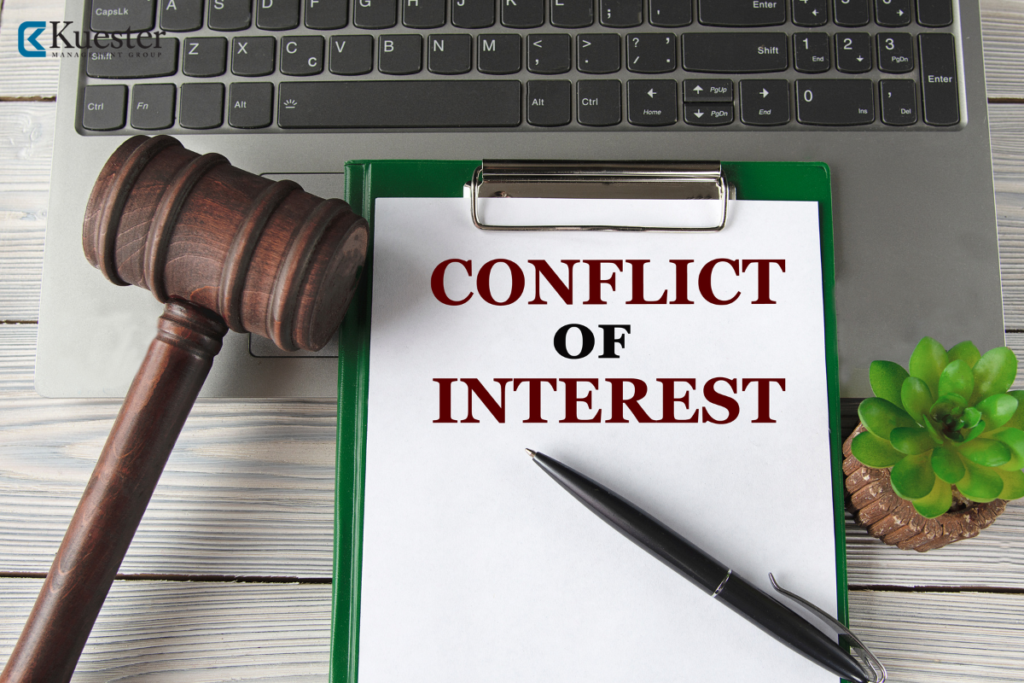Contents
Serving on a homeowners association (HOA) board can be a rewarding way to contribute to your community, but it also comes with responsibilities–and potential pitfalls. One of the most critical issues board members and homeowners must understand is the concept of conflict of interest.
Conflicts of interest occur when a board member’s personal, financial, or relational interests could influence–or appear to influence–their decisions. Left unchecked, conflicts can erode trust, create legal liability, and undermine the integrity of the HOA.
Whether you are a board member seeking to act ethically or a homeowner looking to ensure transparency, understanding how to identify and prevent conflicts is essential. Partnering with Kuester Management Group, which provides professional HOA management services in Charlotte, Huntersville NC, Wilmington NC, Myrtle Beach SC, and Fort Mill SC, can provide guidance on maintaining impartial decision-making and protecting your community.
This article explores what conflicts of interest look like, why they matter, legal standards, and practical strategies to prevent them. You’ll also learn best practices for disclosure, recusal, and policy development to safeguard both board members and homeowners.
What Is a Conflict of Interest in an HOA Context?
A conflict of interest occurs when a board member’s personal, financial, familial, or relational interests could compromise their ability to make impartial decisions for the community. These conflicts may be:
- Financial: Owning a business that provides services to the HOA, receiving gifts, or profiting indirectly from HOA decisions.
- Relational: Favoring friends, relatives, or business partners when enforcing rules or approving projects.
- Personal or Political: Making decisions that benefit the board member’s lifestyle or property rather than the HOA as a whole.
Conflicts are not always obvious. Even well-intentioned decisions can create perceived conflicts if the board member stands to benefit, making disclosure and transparency essential.

Common Examples of Conflicts of Interest
Conflicts of interest can manifest in many ways. Here are some common scenarios:
- Vendor Contracts: A board member owns a landscaping company bidding for HOA work. Awarding the contract without disclosure is a clear conflict.
- Rule Enforcement: Board members selectively enforce HOA rules, such as fines for parking violations or pet restrictions, based on personal relationships.
- Gifts or Benefits: Receiving free or discounted goods or services from a vendor in exchange for favorable treatment.
- Personal Gain: Voting on policy changes or community improvements that directly enhance the board member’s property value.
Even seemingly minor conflicts can erode trust if left unchecked. Proactively addressing these situations maintains the integrity of the board.
Why Conflicts of Interest Matter
Unchecked conflicts of interest have real consequences:
- Erosion of Trust: Homeowners lose confidence in the board when decisions appear biased or self-serving.
- Legal and Financial Risks: Improperly handled conflicts can lead to lawsuits, fines, or invalidated contracts.
- Reduced Community Engagement: Residents may disengage from HOA meetings, elections, or volunteer efforts if they perceive unfairness.
- Lower Property Values: A reputation for mismanagement can negatively impact real estate sales and community desirability.
Identifying and managing conflicts early is essential for long-term HOA stability.
How to Identify and Handle Conflicts
Proactive identification and proper handling are key to preventing conflicts from escalating. Boards should:
- Require Disclosure: Board members should declare any personal, financial, or relational interests before votes or discussions.
- Recuse When Necessary: Members with a conflict should abstain from discussions and votes, and in some cases, leave the room entirely.
- Document Everything: Minutes should note disclosures and recusals to provide a clear record.
- Involve Neutral Parties: When conflicts are significant, other board members or homeowners may need to review or approve decisions.
- Educate Homeowners: Encourage residents to raise concerns if they notice potential conflicts, and provide clear channels for reporting.
Legal Standards and Procedures
HOA boards must comply with state statutes and governing documents. Key considerations include:
- Fiduciary Duties: Board members must act with loyalty, care, and obedience. Breaching these duties by failing to disclose conflicts can result in personal liability.
- Disclosure Requirements: Some states, like Florida, mandate disclosure of conflicts 14 days before a vote. Requirements vary by jurisdiction, so reviewing state law is critical.
- Governing Documents: Bylaws and CC&Rs may include conflict-of-interest policies and define procedures for recusal and disclosure.
Following legal standards helps ensure decisions are enforceable and reduces exposure to lawsuits.

Best Practices and Policies to Prevent Conflicts
Implementing policies and education programs helps prevent conflicts from arising:
- Adopt a Conflict-of-Interest Policy: Clearly define what constitutes a conflict and outline procedures for disclosure and recusal.
- Include Ethics Codes: A code of conduct or ethics can reinforce expected behavior for board members.
- Require Vendor Disclosure: When soliciting bids, ask vendors to declare any affiliations with board members.
- Regular Training: Educate board members on fiduciary duties, ethics, and legal responsibilities annually.
- Transparent Processes: Ensure budgeting, vendor selection, and rule enforcement follow documented procedures.
These steps promote fairness, reduce legal risk, and protect homeowner trust.
Consequences of Ignoring Conflicts
Ignoring conflicts can have serious implications:
- Loss of Homeowner Trust: Residents may feel disenfranchised or suspicious of decisions.
- Legal Liability: Undisclosed conflicts can lead to lawsuits or voided contracts.
- Financial Risk: Conflicted decisions may result in financial mismanagement or fines.
- Reputational Damage: A board known for favoritism or misconduct may struggle to recruit volunteers and engage homeowners effectively.
Addressing conflicts and staying ahead of the game is far more effective than managing crises after they occur.
How Kuester HOA Management Helps Prevent Conflicts
Professional management can make a significant difference. At Kuester HOA Management, we help boards:
- Implement clear conflict-of-interest policies and codes of conduct.
- Train board members on ethical standards, fiduciary duties, and recusal procedures.
- Document disclosures, recusals, and meeting minutes to maintain transparency.
- Facilitate impartial vendor selection and budgeting processes.
- Provide oversight that ensures fair decision-making across the community.
Working with Kuester allows boards to focus on community improvement while minimizing conflicts and protecting homeowner trust. We provide best-in-class HOA management services across both North and South Carolina
Protect Your HOA–Reach Out Today
Conflicts of interest on HOA boards are more than ethical dilemmas–they are legal and reputational risks that can undermine the stability of your community. By understanding what constitutes a conflict, identifying it early, and implementing robust policies and procedures, boards can protect homeowners and themselves.
Partnering with a professional management company like Kuester ensures transparent governance, consistent enforcement of rules, and guidance on legal compliance. A proactive approach promotes trust, accountability, and a stronger, more cohesive community.
FAQs
What exactly is a conflict of interest in an HOA?
A conflict occurs when a board member’s personal, financial, or relational interests could compromise impartial decisions for the community.
Must board members always recuse themselves?
Yes, whenever a material conflict exists, they should abstain from discussion and voting, and sometimes leave the room entirely.
Can an HOA member vote to approve a transaction involving a conflict?
No, board members with a conflict should not vote on decisions where they stand to benefit.
What should homeowners do if they suspect conflicts?
Homeowners can attend meetings, request records, and submit written concerns to ensure transparency.
Are there legal penalties for undisclosed conflicts?
Yes, failure to disclose can result in personal liability, voided contracts, or lawsuits against the board.
How can HOAs prevent conflicts upfront?
Adopt a conflict-of-interest policy, enforce a code of conduct, require disclosure, and provide board training.

